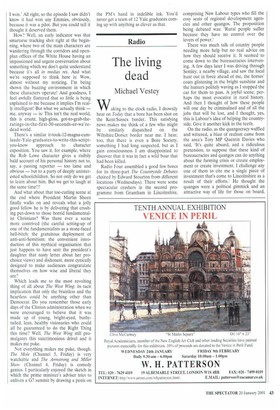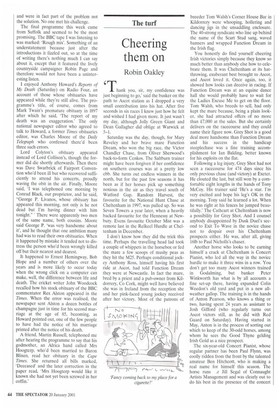The living dead
Michael Vestey
Waking to the clock radio, I drowsily hear on Today that a bore has been shot on the Kent/Sussex border. This satisfying news makes me think of a few who might be similarly dispatched on the Wiltshire/Dorset border near me. I hear, too, that there is even a Bore Society, something I had long suspected, but as I gain consciousness I am disappointed to discover that it was in fact a wild boar that had been killed.
Radio Four assembled a good few bores for its three-part The Corinoyside Debates chaired by Edward Stourton from different locations (Wednesdays). There were some spectacular crashers in the second programme from Grantham in Lincolnshire, comprising New Labour types who fill the cosy seats of regional development agencies and other quangos. The proposition being debated was: 'Rural people suffer because they have no control over the levers of power.'
There was much talk of country people needing more help but no real advice on how they should receive it. It seemed to come down to the bureaucracies intervening. A few days later I was driving through Semley, a nearby village, and saw the local hunt out in force ahead of me, the horses' coats glistening in the bright sunshine and the hunters politely waving as I stopped the car for them to pass. A joyful scene, perhaps the most evocative in rural history. And then I thought of how these people will one day be criminalised and of all the jobs that will be lost, and I thought, yes, this is Labour's idea of helping the countryside. Give it another kick in the teeth.
On the radio, as the quangocracy waffled and wittered, a blast of realism came from the area's Tory MP Quentin Davies who said, 'It's quite absurd, and a ridiculous pretension, to suppose that these kind of bureaucracies and quangos can do anything about the farming crisis or create employment or create investment. I challenge any one of them to cite me a single piece of investment that's come to Lincolnshire as a result of their efforts.' He thought the quangos were a political gimmick and an attractive way of life for those on board, and were in fact part of the problem not the solution. No one met his challenge.
The final programme this week came from Suffolk and seemed to be the most promising. The BBC tape I was listening to was marked: 'Rough mix'. Something of an understatement because just after the introductions it fizzled out, so at the time of writing there's nothing much I can say about it, except that it featured the lively countryside campaigner Robin Page and therefore would not have been a uninteresting listen.
I enjoyed Anthony Howard's Reports of My Death (Saturday) on Radio Four, an account of those whose obituaries have appeared while they're still alive. The programme's title, of course, comes from Mark Twain's premature obituary in 1897 after which he said, 'The report of my death was an exaggeration.' The only national newspaper editor who agreed to talk to Howard, a former Times obituaries editor, was Charles Moore of the Daily Telegraph who confessed there'd been three such errors.
Lord Colyton's obituary appeared instead of Lord Collison's, though the former did die shortly afterwards. Then there was Dave Swarbrick of Fairport Convention who'd been ill but who recovered sufficiently to attend his concerts, proudly waving the obit in the air. Finally, Moore said, was telephoned one morning by Conrad Black, our proprietor, and he said, "George P. Livanos, whose obituary has appeared this morning, not only is he not dead but I'm having dinner with him tonight." ' There were apparently two men of the same name, both cousins. Moore said George P. `was very handsome about it', and he thought that one ambition many had was to read their own obituaries. When it happened by mistake it tended not to distress the person who'd been wrongly killed off but their nearest and dearest.
It happened to Ernest Hemingway, Bob Hope and a number of others over the years and is more likely to occur today when the wrong click on a computer can make, well, the difference between life and death. The cricket writer John Woodcock recalled how his stock obituary of the BBC commentator Rex Alston appeared in the Times. When the error was realised, the newspaper sent Alston a dozen bottles of champagne just in time for his second marriage at the age of 85, becoming, as Howard pointed out, one of the few people to have had the notice of his marriage printed after the notice of his death.
A friend, Martin Russell, telephoned me after hearing the programme to say that his godmother, an Africa hand called Mrs Hoogterp, who'd been married to Baron Blixen, read her obituary in the Cape Times. She returned all bills marked, 'Deceased' and the later correction in the paper read, 'Mrs Hoogterp would like it known she had not yet been screwed in her coffin.'































































 Previous page
Previous page